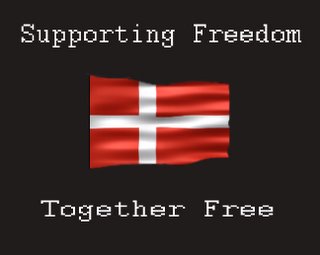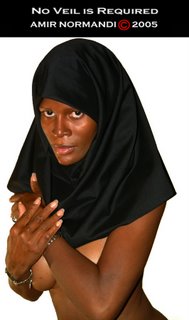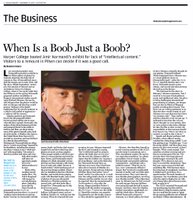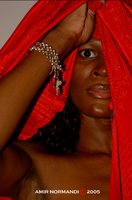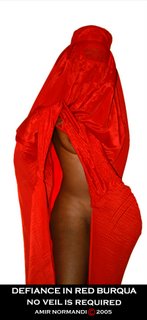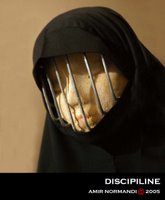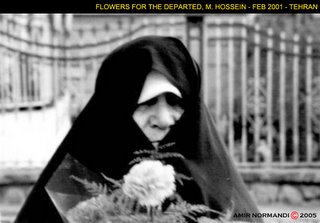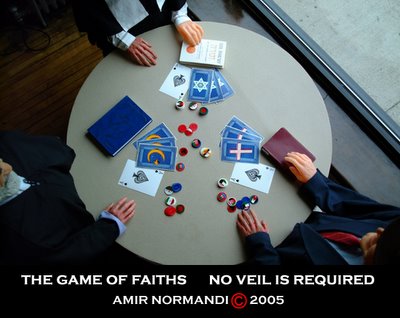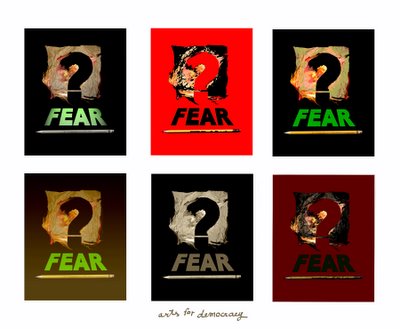
"Childish. Irresponsible. Hate speech. A provocation just for the sake of provocation. A PR stunt. Critics of 12 cartoons of the prophet Muhammad I decided to publish in the Danish newspaper Jyllands-Posten have not minced their words. They say that freedom of expression does not imply an endorsement of insulting people's religious feelings, and besides, they add, the media censor themselves every day. So, please do not teach us a lesson about limitless freedom of speech.
I agree that the freedom to publish things doesn't mean you publish everything. Jyllands-Posten would not publish pornographic images or graphic details of dead bodies; swear words rarely make it into our pages. So we are not fundamentalists in our support for freedom of expression.
Those examples have to do with exercising restraint because of ethical standards and taste; call it editing. By contrast, I commissioned the cartoons in response to several incidents of self-censorship in Europe caused by widening fears and feelings of intimidation in dealing with issues related to Islam. And I still believe that this is a topic that we Europeans must confront, challenging moderate Muslims to speak out. The idea wasn't to provoke gratuitously -- and we certainly didn't intend to trigger violent demonstrations throughout the Muslim world. Our goal was simply to push back self-imposed limits on expression that seemed to be closing in tighter.
At the end of September, a Danish standup comedian said in an interview with Jyllands-Posten that he had no problem urinating on the Bible in front of a camera, but he dared not do the same thing with the Koran.
This was the culmination of a series of disturbing instances of self-censorship. Last September, a Danish children's writer had trouble finding an illustrator for a book about the life of Muhammad. Three people turned down the job for fear of consequences. The person who finally accepted insisted on anonymity, which in my book is a form of self-censorship. European translators of a critical book about Islam also did not want their names to appear on the book cover beside the name of the author, a Somalia-born Dutch politician who has herself been in hiding.
Around the same time, the Tate gallery in London withdrew an installation by the avant-garde artist John Latham depicting the Koran, Bible and Talmud torn to pieces. The museum explained that it did not want to stir things up after the London bombings. (A few months earlier, to avoid offending Muslims, a museum in Goteborg, Sweden, had removed a painting with a sexual motif and a quotation from the Koran.)
Finally, at the end of September, Danish Prime Minister Anders Fogh Rasmussen met with a group of imams, one of whom called on the prime minister to interfere with the press in order to get more positive coverage of Islam.
So, over two weeks we witnessed a half-dozen cases of self-censorship, pitting freedom of speech against the fear of confronting issues about Islam. This was a legitimate news story to cover, and Jyllands-Posten decided to do it by adopting the well-known journalistic principle: Show, don't tell. I wrote to members of the association of Danish cartoonists asking them "to draw Muhammad as you see him." We certainly did not ask them to make fun of the prophet. Twelve out of 25 active members responded ... Read the rest here.
Brilliant Rose
In a comprehensive article in the Sunday Washington Post, Editor Flemming Rose gives us a brilliant rendering of the context within which the decision was made to publish the 12 cartoons that appeared in his newspaper, the Jyllands-Posten on 30 Sept 2005.
For any reader of his article, it will now be clear that between the initial act of publishing and today, the entire cartoon event has morphed from its avowed pre-publication intent - to stimulate debate in the Danish community on the issue of self-censorship with respect to Islam and Muslims - as declared by Mr. Rose, to something quite difference.
He assists our understanding of the whole set of events by dividing it into two narratives – one European and one Middle Eastern.
The trail of evidence shows that the Islamic leaders in the Middle East deliberately created the pan-Islamic outrage and riots for particular political purposes. These issues he puts in the Middle East narrative not the European narrative of this story.
Of the Middle East part he says this.
“The narrative in the Middle East is more complex, but that has very little to do with the cartoons.”
As for the European narrative, writing 19 Feb 2006 in the Sunday article with the insight of a critical witness, Mr. Rose observes and comments on the current face of Danish reaction.
“The Muslim face of Denmark has changed, and it is becoming clear that this is not a debate between "them" and "us," but between those committed to democracy in Denmark and those who are not.”
On the larger issue of freedom of speech as seen through the prism of our western secular democracies, Mr. Rose uses the words of Karl Popper to frame the debate. Popper in his seminal work "The Open Society and Its Enemies," insisted that one should not be tolerant with the intolerant.
For himself and for anyone suffering the intolerance caused by a religious belief, Mr. Rose puts down this red line:
“But if a believer demands that I, as a nonbeliever, observe his taboos in the public domain, he is not asking for my respect, but for my submission. And that is incompatible with a secular democracy.”
As a good newspaper person, Rose chooses to educate readers with this little reality check.
“Nowhere do so many religions coexist peacefully as in a democracy where freedom of expression is a fundamental right. In Saudi Arabia, you can get arrested for wearing a cross or having a Bible in your suitcase, while Muslims in secular Denmark can have their own mosques, cemeteries, schools, and TV and radio stations.”
cn
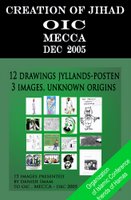 For Danish Imam Laban's terrorist connections, see articles in Jihad ready or are we "tooned" out ?
For Danish Imam Laban's terrorist connections, see articles in Jihad ready or are we "tooned" out ?The lie and the images.
Anatomy of an outrage - Cartoon : Aug 2005 - mid-February 2006
Chronology
January 10 - February 20, 2006 by Reuters
Chronology Protest by Reuters
Protests over Prophet Mohammad cartoons
September 2005 - February 2006 from Wikipedia
Timeline of the Jyllands-Posten Muhammad cartoons controversy
- This article documents a current event. Information may change rapidly as the event progresses.-
September
September:
Flemming Rose, the cultural editor of Jyllands-Posten, commissioned twelve cartoonists to draw cartoons in response to the difficulty that Danish writer Kåre Bluitgen had finding artists to illustrate his children's book about Muhammad, because the artists feared violent attacks by extremist Muslims.
September 30:
The cartoons of Islamic prophet Muhammad are printed in the Danish daily newspaper, Jyllands-Posten.
October
October 9:
The Islamic Society in Denmark demands that Jyllands-Posten apologise to all Muslims and withdraw the cartoons.
October 14:
3,500 people stage a peaceful demonstration outside the Copenhagen office of Jyllands-Posten.
Two of the cartoonists are advised to go into hiding after receiving death threats[3].
October 17:
Egyptian Newspaper El Fagr publishes six of the cartoons during Ramadan along with an article strongly denouncing them, but the publication of the images did not engender any known protests from either Egyptian religious authorities nor the Egyptian government.[4][5]
October 19:
Eleven ambassadors request a meeting with the Prime Minister of Denmark, Anders Fogh Rasmussen, and want him to distance himself from the cartoons in Jyllands-Posten as well as various other allegedly derogatory comments about Islam in the Danish media. The Prime Minister refused to meet the ambassadors, on the grounds that he cannot infringe on the freedom of the press.
October 28:
Danish police are notified by a number of Muslim organizations, claiming that the intention of the publication of the cartoons has been to "mock and deride" the Muslim faith, something the Danish penal code prohibits (§ 140)... find it here.
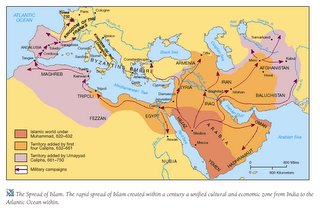
Latest positions today February 20
Russia
Putin - Totalitarian regime is being reinstalledl in Russia.
Loosing everything for publishing cartoons.
Volgograd newspaper's license withdrawn after religious cartoon
VOLGOGRAD,
Feb 20
(RIA Novosti) - " A local media and culture watchdog has annulled the license of a newspaper in the southern Russian city of Volgograd embroiled in a controversy over the publication of a cartoon depicting religious figures, the paper's founder company said Monday.
The head of the municipal company Volgograd Inform, Konstantin Karkachev, said that as of February 21, Gorodskye Vesti newspaper would be banned from publishing. ..."
Pakistan
Wahhabist maddras world center
Pakistan Islamists target "Bush and Mush" on cartoons
By Raja Asghar - Reuters
Feb. 20, 2006
"ISLAMABAD, Feb 20 (Reuters) - Pakistani Islamists vowed on Monday to broaden a campaign against cartoons of the Prophet Mohammad to target the Pakistani and U.S. presidents.
But they failed in an attempt to have parliament debate how the authorities have tried to clamp down on the unrest..."
Iran
Positioning itself for the control of the Islamic anger and fanatism, a prized power switch.
Iran Official: End Cartoon Riots
Fox. AP
Feb 20, 2006
Iranian Urges End to Violence Over Drawings
By CONSTANT BRAND
Feb. 20, 2006.
Globe and Mail
Interesting commentaries

YOUR HONEY OR YOUR LYIN' EYES?
The myth of a vibrant "moderate Islam."
By Andrew C. McCarthy
NRO
Feb. 20, 2006
Benador Associated
"So here we are again, a dazed planet brushing ourselves off and surveying the wreckage from the worst spree of Islam-inspired rioting, bombing, murder, and mayhem since ... well, since the last one. And the one before that... Here."

Must also read Because They Hate
By Brigitte Gabriel
FrontPageMagazine.com
Feb. 20, 2006
Selected excerpts from Brigitte Gabriel's speech delivered at the Intelligence Summit in Washington DC, February 18, 2006.
"We gather here today to share information and knowledge. Intelligence is not merely cold hard data about numerical strength or armament or disposition of military forces. The most important element of intelligence has to be understanding the mindset and intention of the enemy. The West has been wallowing in a state of ignorance and denial for thirty years as Muslim extremist perpetrated evil against innocent victims in the name of Allah.
I was ten years old when my home exploded around me, burying me under the rubble and leaving me to drink my blood to survive, as the perpetrators shouted “Allah Akbar!” My only crime was that I was a Christian living in a Christian town. At 10 years old, I learned the meaning of the word "infidel."
Brigitte Gabriel - Expert on the Middle East conflict and lectures nationally and internationally on the subject. She's the former news anchor of World News for Middle East television and the founder of AmericanCongressforTruth.com.
Islam’s Torture of Lebanon
By Jamie Glazov
FrontPageMagazine.com
August 11, 2005
"Frontpage Interview guest today is Brigitte Gabriel, a survivor of Islam's Jihad against Lebanese Christians..."
Photo source for map of South West Asia Ablongman.com




